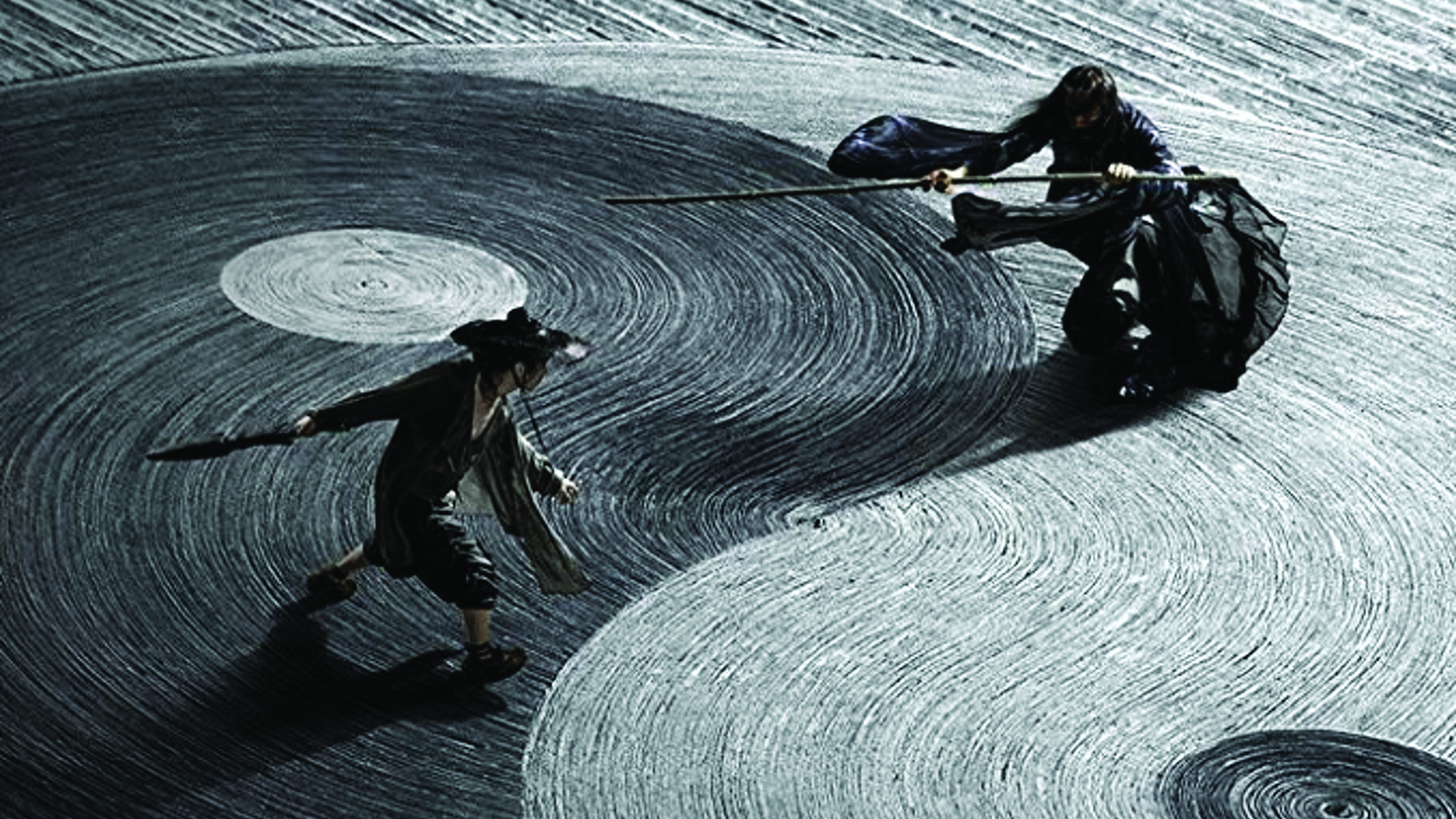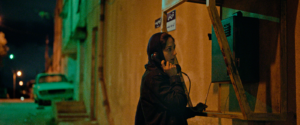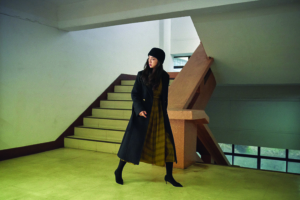Sword-wielding warriors, lofty, dramatic flights and epic historical backdrops are hallmarks of Chinese director Zhang Yimou’s striking wuxia films: Hero (2002), House of Flying Daggers (2004) and Curse of the Golden Flower (2006). Building worlds with ornate finesse, these films conjure emotive forces through vibrant, eye-popping colours and heightened choreography. His latest film, Shadow (2018), marks a lavish return to form, but he subverts the motifs audiences have come to expect by employing almost monochromatic cinematography and carefully crafted movement. Here, a muted palette instils the film with the elegance of Chinese ink-brush paintings, bringing forth starker depictions of violence that provoke more severe questions about the consequences of a destructive gluttony for power.
Shadow opens on a quivering Madam (Sun Li) peering through the keyhole of a high-scaling royal-palace door. An intertitle conveys that she is on the brink of making ‘the most difficult choice of her life’, though this deliberation is – as revealed later, in a cyclical return to the same shot – a flash-forward. The scene foreshadows Shadow’s knotty obsession with royal politics, wherein intrigue and secrets lie behind closed doors and decisions can make or break the status quo.
Set during the Three Kingdoms era, the film soon reveals its master schemer as the King of Pei’s (Zheng Kai) supposedly loyal second-in-command, Madam’s husband, Commander Yu (Deng Chao). The scene immediately following the flash-forward shows the Commander entering the palace to face the ramifications of his defiant actions, having just bristled tensions with the foreign forces that have occupied the city of Jing. Exiled from their own land, representatives of the Pei Kingdom, headed by their young king, have struck a peace treaty with General Yang (Hu Jun) and his troops. It’s a long, detailed set-up of the palace’s twisty relations, but the details are crucial: Zhang’s adapted script, penned with Li Wei and based on an original screenplay by Zhu Sujin, is another example of the director’s propensity for taking history into his own hands. Dismissing any sense of historical accuracy in this film, he has admitted to Variety: ‘It’s no longer a Three Kingdoms story following my adaptation.’[1]Zhang Yimou, quoted in Patrick Frater, ‘Zhang Yimou Explores New Ideas in Shadow’, Variety, 5 September 2018, <https://variety.com/2018/film/spotlight/zhang-yimou-shadow-venice-film-festival-1202928306>, accessed 15 February 2019. Yet the creative licence Zhang has taken has made for a more fascinating tale, with the Commander’s Machiavellian scheme reimagining this episode in China’s past. Masquerading as an obedient subordinate, the Commander successfully conceals his duplicity deep within the labyrinthine royal residence. In time, we discover that this duplicity takes physical shape in the form of his own doppelganger: a ‘shadow’ intended to be a body double, ensuring that his position in the aristocratic hierarchy remains secure. The Shadow is Jing (also played by Deng) – kidnapped off the streets by the Commander’s father, forced to live in obscurity for twenty years, and named after the very city this double was raised to capture.
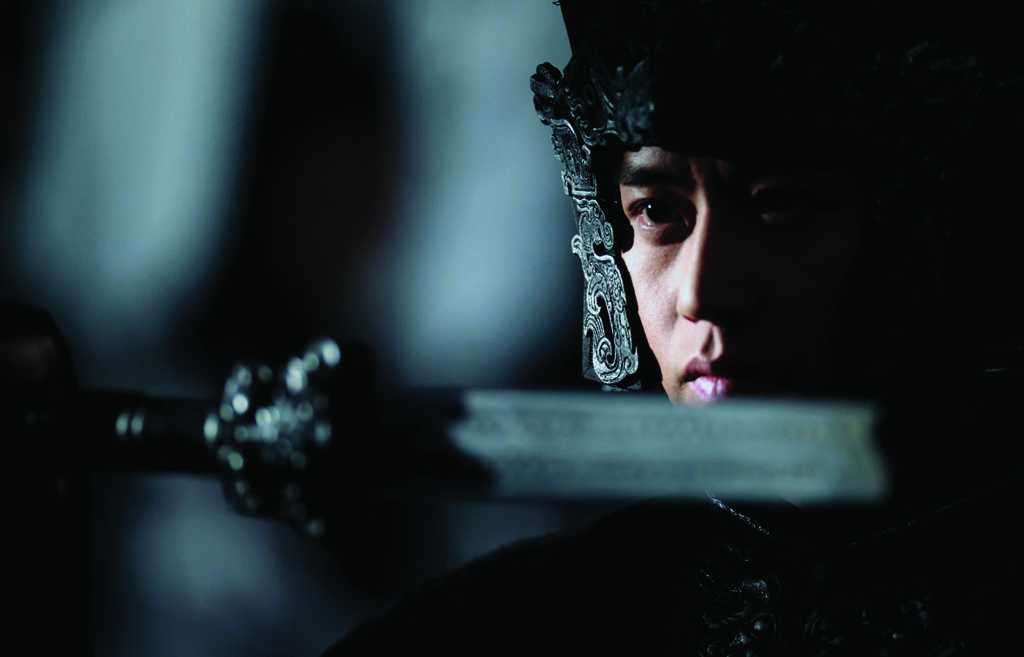
The film reveals the Shadow’s hideaway through a cut away from the decorative expanses of the royal compound, the camera sliding through a damp cranny and into the palace’s underground. In this den, we then see the Commander, long-haired and considerably aged, hanging over the fresh-faced Jing. He pierces Jing’s bare chest with a small dagger, the Commander impassive as his double’s pained howl echoes through the cave; simply, he says their ‘two hearts must beat as one’. We learn that, with the Commander’s health deteriorating as a result of his fight with General Yang, Jing has been tasked with assuming the part of his nobleman equivalent. And, through this exchange, Zhang affirms the agony of men with no status when they are reduced to pawns and ruined as the powerful execute exploitative gambits for rank.
This forced duplication of a single identity opens up a personal crisis for Jing, whose sense of self becomes marred with questions about his own individuality. He becomes not only a ‘shadow’ for the Commander’s former younger, more attractive self, but also an object for Madam’s deflected affection. During an intimate scene in which Madam applies ointment on his wound, Jing desperately exclaims: ‘I am nothing but a servant.’ Close-ups of their faces betray their magnetic connection. ‘You are you … you yearn to go home,’ Madam replies, soft-spoken. Jing’s desires and consequent reasons for compliance, unlike those of his double, aren’t linked to the royal power struggle; he yearns for Madam’s reciprocal attention and a long-awaited reunion with his mother.
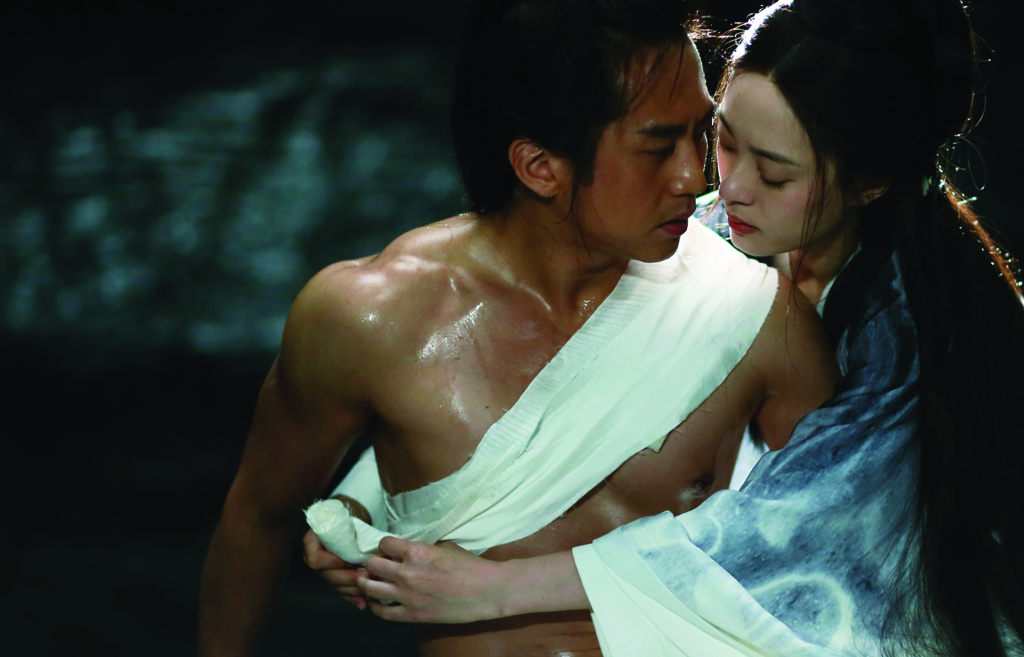
Jing’s fear of losing himself within the castle’s imprisoning walls and among the entangling power plays is captured with subdued lighting, which blankets the film with desaturated gloom. Shadow features few artificial lights, though it depicts Jing – scared of the darkness – unable to sleep without his candle, which flickers through the veiled screens of his bedchamber; if he succumbs completely to the darkness, to his role as a shadow, then who really is he? Although cinematographer Zhao Xiaoding (a frequent collaborator of Zhang’s, having worked on titles such as House of Flying Daggers and 2014’s Coming Home) captures the muted colours of skin tones and spilt blood, Shadow’s primarily black-and-white composition visually represents the dichotomous forces at play in the film. Yet only rarely does light leak into the greyscale frame, such as through crevices between rocks in the underground – streaks of optimism largely drowned out in a world of gloom.
Zhang drenches Shadow in a greyscale that matches its ink-brush quality, but the triad of blacks, whites and greys is also tainted by pale skin tones and sickeningly red blood: colourful diversions that steadily pin the film’s focal point on the human body.
The specific way these colours and textures manifest in Shadow give the impression that each frame has been painted with an ink brush, an aesthetic choice that is also illustrative of revisionary history drawn fresh onto a new canvas. The film’s lavish production design only brings this inspired approach further to life. A spectacular bird’s-eye shot bears witness to the Commander and his Shadow during a practice duel; rain spatters from the heavens onto an enlarged tai chi symbol, the pair standing on opposite sides – one on the yang, the other on the yin. The whooshing of their silk robes punches through the slow-motion choreography, the men moving with grace as though in a flight-like dance. The epic motions of their bodies become more defined through the careful use of contrast and lines, the silky, elaborate aesthetic rendering everything in the frame as though brushstrokes on parchment.
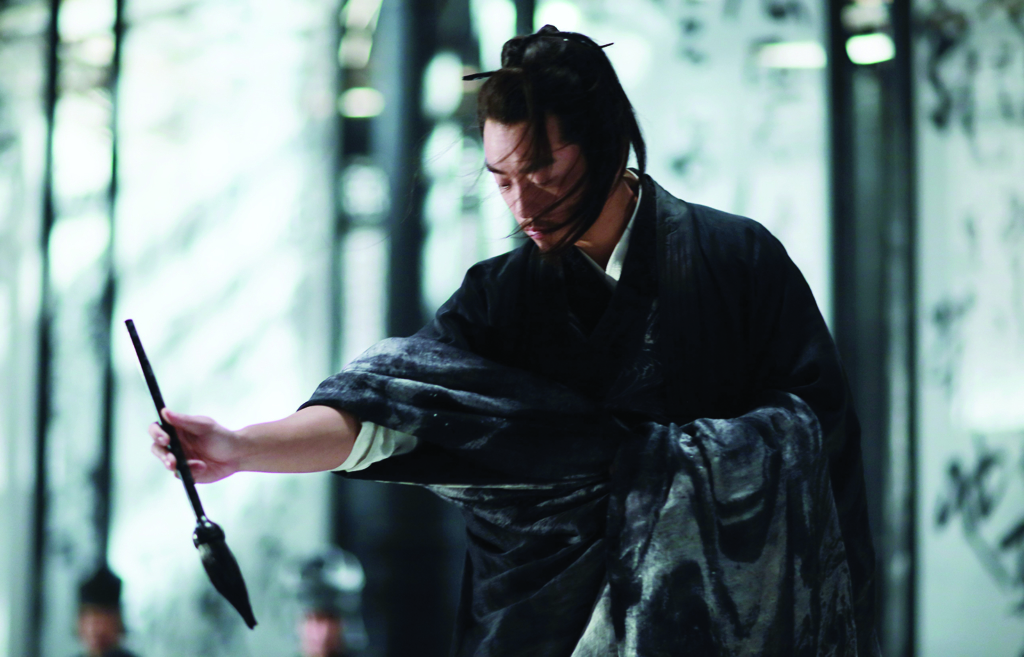
Zhang drenches Shadow in a greyscale that matches its ink-brush quality, but the triad of blacks, whites and greys is also tainted by pale skin tones and sickeningly red blood: colourful diversions that steadily pin the film’s focal point on the human body. It aligns with Zhang’s signature use of colour – in this instance, expressive monochrome and the bleeding-through of singular chromatic schemes – to elucidate characters’ emotions as well as larger meanings underpinning narrative events. It’s a trademark displayed in his earlier wuxia films: in Hero, colours come alive to distinguish conflicting versions of events; as director of photography Christopher Doyle described it at the time, ‘Every story is colored by personal perception.’[2]Christopher Doyle, quoted in Robert Mackey, ‘Cracking the Color Code of Hero’, The New York Times, 15 August 2004, <https://www.nytimes.com/2004/08/15/movies/film-cracking-the-color-code-of-hero.html>, accessed 15 February 2019. Rather than tapping into colours’ conventional symbolic associations, however, Hero uses them to weave together thematic threads. For instance, pulsing red costuming, brushwork and flags visualise the romance between assassins Broken Sword (Tony Leung Chiu-Wai) and Flying Snow (Maggie Cheung Man-Yuk). In a similar vein, House of Flying Daggers utilises colour for extravagant symbolism, with green, in particular, representing the height of conflict. The iconic fight set in a bamboo forest sees Xiao Mei (Zhang Ziyi) wielding a bamboo stick as her weapon, scraping it across lush grass and having it splinter against the soldiers’ verdant uniforms. Elsewhere, colour coordination creates a unique ambience that feels both natural and rhapsodic in its beauty, as when silhouettes of green-clad soldiers fly through treetops, contributing to the film’s overall sense of grandeur.
Yet Zhang’s indulgent, showy aesthetic – which aligns with those of his wuxia contemporaries – is not without criticism. As academic Abi Stevens has pointed out, following Ang Lee’s Crouching Tiger, Hidden Dragon (2000) and Zhang’s own Hero, the lavish wuxia style became particularly attractive to audiences outside of East Asia. But, as the genre rose to global success, so did scrutiny, with this recent iteration of wuxia criticised for participating in a form of ‘cross-cultural spectatorship’ that panders to a transnational audience.[3]Abi Stevens, ‘Short Guide to the Wuxia Film’, Mapping Contemporary Cinema, 2012, <http://www.mcc.sllf.qmul.ac.uk/?p=1384>, accessed 15 February 2019. Yet, as researcher Stephen Teo writes, ‘What is unique about wuxia in the contemporary era as the genre entrenches itself in the Chinese Mainland is precisely this juggling of transnationalism and nationalism.’[4]Stephen Teo, Chinese Martial Arts Cinema: The Wuxia Tradition, Edinburgh University Press, Edinburgh, 2009, p. 180.
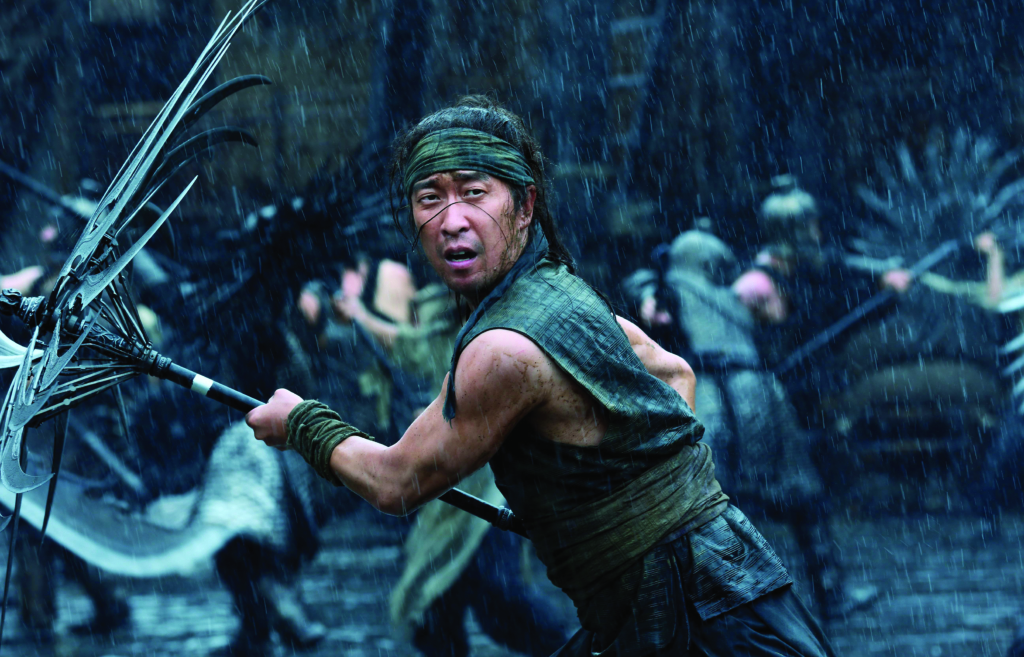
Such is the case with Shadow, which calibrates elements specific to Chinese culture and history (if a little inaccurately) to appeal to an international audience. Here, human movement is not simply deployed for dazzling spectacle, but also to convey the brutal manner in which conflicting forces counter each other. Much like how black and white are juxtaposed, the opposing forces are shown brandishing weapons that correspond with the traditional gender binary. The Pei Kingdom’s victory weapon is an umbrella, an object associated with femininity, which contrasts with the Yang forces’ more conventional, ‘masculine’ sword. In the film’s climactic clash between the Pei and Yang forces, hundreds of female Pei convicts, waiting in a secret forest location, ambush Jing City. The umbrellas they wield assume another form, now made of glittering silver blades and spinning like windmills. As the umbrellas open, the blades puncture the air and clang against one another; the sound design amplifies the cohort’s noisy movement as they slide down a hill as one. Blades fly into human bodies; flesh is slashed; bones are broken. The red blood that spills out stains the almost monochrome frame with a vivid lucidity – a staggering reminder of the fragility of the human body, and of how the ruthlessness of war makes survival a gruelling struggle. The enormity of the body count is writ large.
While the film is largely consumed with the power struggles on the field and within the royal court, it also emphasises the subjugation suffered by women expected to obey their husbands and family members. The Princess (Guan Xiaotong) – sister to the King – laments that the future lies in ‘masculine power’, her world having no place for women like her and Madam. Although the Princess is amusingly outspoken (she sits behind a translucent screen, throwing jibes at her brother while he orders his men), she is humiliatingly sold as a concubine to General Yang’s son, Ping (Leo Wu), to keep the peace between the kingdoms. On the one hand, the Princess is granted some agency – later, disguised as a female convict, she takes control of her own fate in a violent duel. Yet, on the other, she, like Madam, inevitably takes a back seat while this deadly drama plays out; the two women are rendered passive by men who use them as devices to enable impulsive masculine action. Though her kingdom emerges victorious, the Princess dies in her pursuit of justice, and Madam must sit silently as she watches Jing return successfully from battle in the Commander’s guise.
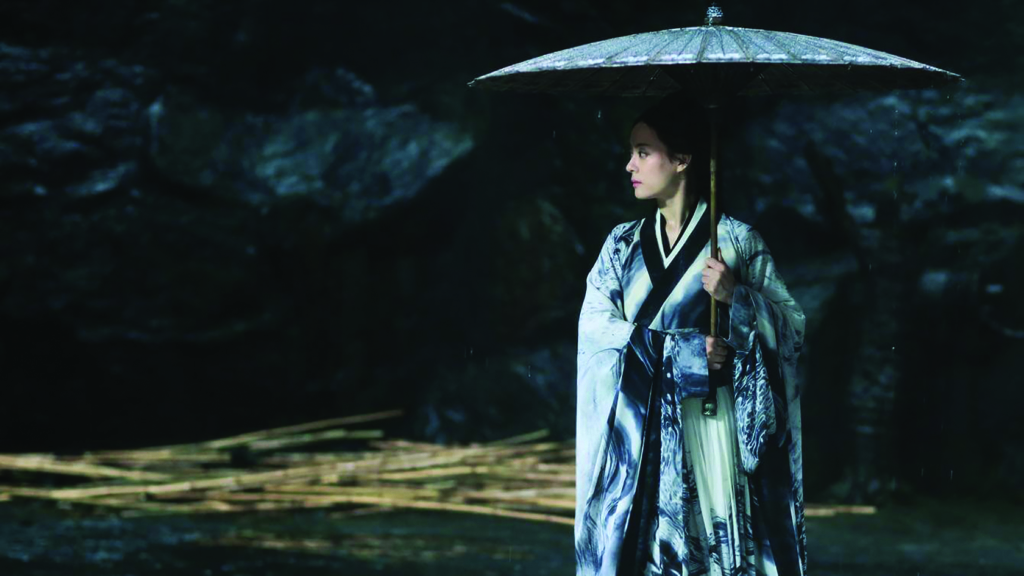
The suppression of women under male rule is not a new theme for Zhang, who previously explored it in the operatic Curse of the Golden Flower. But, unlike that drama, which portrayed the physically and mentally crippling effects of male-dominated leadership through a woman’s eyes, Shadow shuffles its women to the sidelines, shifting its focus to an ordinary man who rises to overcome his own subservience. During a Q&A at the 2018 Toronto International Film Festival, Zhang asserted this very wish to spotlight Jing’s triumph over aristocracy:
I decided to make a film about […] an ordinary person and how this commoner struggles for survival while he’s caught in the middle of the power play. As a body double, he was able to finally regain control of his own fate and, in the end, he even had a choice: […] Will he become the new king of this old kingdom, or will he just forget all about it and return to his original […] identity as a commoner?[5]Zhang Yimou (via translator), in ‘Shadow Director Q&A | TIFF 2018’, YouTube, 12 September 2018, <https://www.youtube.com/watch?v=m4cMc0r-pQA>, accessed 15 February 2019.
But perhaps, ultimately, Shadow speaks more to the brutal consequences of exploitation and manipulation than to its protagonist’s struggle against social hierarchy. At the conclusion of the film, Jing emerges from the palace, bleeding heavily; he communicates to the Pei army waiting outside that an intruder has killed their king. This is all a ruse, of course – in preceding scenes, Jing callously murdered both of his masters: the King and the Commander. In this moment, Jing is no longer the Shadow; having defeated his oppressors, he now has an identity of his own. Yet it is one that becomes inextricably part of a corrupt cycle that links him to his predecessors’ mindless violence.
As we return to Madam watching through the keyhole, confronted with the ‘difficult choice’ of whether to reveal Jing’s true identity or keep silent, a larger question arises: will it even make a difference? Whereas once she was the Shadow’s source of comfort during his darkest days, it is now she who is shut behind closed doors and in need of consolation. As Madam learns, in the struggle for power, there is little room for remorse.
Endnotes
| 1 | Zhang Yimou, quoted in Patrick Frater, ‘Zhang Yimou Explores New Ideas in Shadow’, Variety, 5 September 2018, <https://variety.com/2018/film/spotlight/zhang-yimou-shadow-venice-film-festival-1202928306>, accessed 15 February 2019. |
|---|---|
| 2 | Christopher Doyle, quoted in Robert Mackey, ‘Cracking the Color Code of Hero’, The New York Times, 15 August 2004, <https://www.nytimes.com/2004/08/15/movies/film-cracking-the-color-code-of-hero.html>, accessed 15 February 2019. |
| 3 | Abi Stevens, ‘Short Guide to the Wuxia Film’, Mapping Contemporary Cinema, 2012, <http://www.mcc.sllf.qmul.ac.uk/?p=1384>, accessed 15 February 2019. |
| 4 | Stephen Teo, Chinese Martial Arts Cinema: The Wuxia Tradition, Edinburgh University Press, Edinburgh, 2009, p. 180. |
| 5 | Zhang Yimou (via translator), in ‘Shadow Director Q&A | TIFF 2018’, YouTube, 12 September 2018, <https://www.youtube.com/watch?v=m4cMc0r-pQA>, accessed 15 February 2019. |
